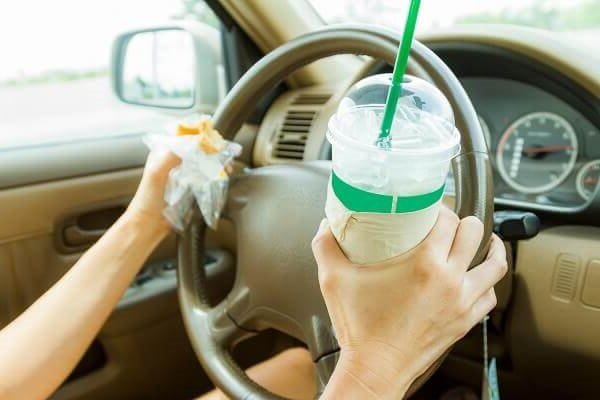Car Accident Attorney Fighting for Compensation for Victims of Negligent Drivers in West Palm Beach,
While the National Highway Traffic Safety Administration (NHTSA) calls texting “by far the most alarming distraction” for drivers, texting behind the wheel is far from the only dangerous driver distraction. Anything that takes a driver’s hands off of the wheel or eyes off of the road can increase the risk of a collision, and that includes…food.
But, is eating and driving negligent? In other words, if you are injured in an accident caused by a driver who was eating, can you file a personal injury claim to recover your medical bills and other losses?
Recovering Just Compensation for Eating-While-Driving Accidents
Under law and the laws of other states around the country, the answer to these questions is potentially a “Yes.” Distracted driving is negligent driving, and it does not matter whether the distraction is a cell , a GPS device, a map, or a burger. All drivers owe a legal duty to exercise due care on the public roadways, and allowing any non-driving activity to get in the way of driving safely can result in financial liability.
The Risks of Eating Behind the Wheel
Statistics from the NHTSA and other organizations reveal the extent of the risks of eating behind the wheel. As published by Decide to Drive, a collaboration between the Auto Alliance and the American Academy of Orthopaedic Surgeons:
- The NHTSA estimates that eating behind the wheel increases a driver’s chances of causing an accident by 80 percent.
- Lytx, a driver risk management company, reports that eating and drinking make drivers 3.6 times more likely to cause a crash.
- According to a study conducted by Exxon Mobil, 70 percent of drivers admit to eating while driving, and 83 percent drink (non-alcoholic) beverages behind the wheel.
The same three factors that make texting and driving dangerous are what make eating and driving dangerous as well:
- Cognitive Impairment – Focusing on eating, avoiding drips, and brushing away crumbs all distract drivers from the primary task at hand.
- Manual Impairment – Unwrapping a sandwich or holding a piece of food prevents drivers from keeping both hands on the wheel.
- Visual Impairment – When drivers are looking at their food, they are not looking at the road.
One of the worst issues with eating-related car accidents is that they are 100 percent avoidable. Just like sending or reading a text message, eating can wait. Drivers can plan ahead to avoid becoming insatiably hungry on the road; and, if they get hungry enough to stop for food or pull out a snack, they can park and eat instead of choosing to put themselves and others at risk for serious – or perhaps fatal – injuries.
Schedule a Free Palm Beach, Car Accident Consultation
If you or someone you love has been injured in a car accident in Palm Beach County, the team at Brian D. Guralnick Injury Lawyers is here to help. We provide aggressive legal representation for victims of distracted driving accidents, and we help our clients Demand More® for their injuries and losses. If you would like to speak with an experienced attorney your legal rights, call me, Brian D. Guralnick, personally at 561-202-6673 for a free consultation.
Disclaimer: The information in this blog is not intended, and must not be taken, as legal advice on any particular set of facts or circumstances. If you need advice on specific legal issues, please consult with a licensed Personal Injury attorney.
Were you or a loved one injured in an accident?
The law offices of Brian D. Guralnick help Florida residents and tourists seek compensation and Demand More? for their injuries.

